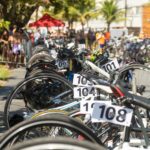Triathlon is obviously important to you. You put a great deal of effort into your triathlon participation. Because of this, you put your ego on the line every time you get to the starting line. When you don’t perform well, you’re disappointed. This may not feel good, but it’s natural because it means you care about your triathlon.
There is, however, a point at which you can lose perspective and your feelings toward your racing can hurt your performances. The key warning signal of this overinvolvement is “too.” When you care too much, when it is too important to you, when you try too hard, when you press too much, then you have lost perspective.
In this “too” situation, triathletes’ investment in their training and racing is so great that it is no longer enjoyable. If you find yourself feeling this way, you should reevaluate what your triathlon participation means to you and how it impacts your life and your happiness. You will probably find that it plays too big a role in how you feel about yourself. When this happens, you not only perform poorly and have worse results, but you may find that triathlon is no longer fun.
To have fun and perform your best, you need to keep your triathlon participation in perspective. It may be important to you, but it should not be life or death. What is important is that you have a balanced view of triathlon. Remember why you participate; it’s fun, it feels great to push your limits, and, yes, you like to compete and achieve your goals. The Prime Triathlon view of competition means keeping your triathlon in perspective. If you have fun, work hard, enjoy the process of triathlon, and do not care too much about winning and losing, you will enjoy triathlon more, you will perform better, and you will have better results as well
Developing Prime Motivation
Motivation is the foundation of Prime Triathlon. Without your desire and determination to improve your triathlon performances, everything else is meaningless. To become the best triathlete you can be, you must be motivated to do what it takes to maximize your ability.
Focus on your long-term goals. To be your best, you have to put a lot of time and effort into your triathlon. But all of that time and effort is not always enjoyable. I call this the Grind, which involves having to put hours upon hours of time into training, well beyond the point that it is fun and exciting. During those times, focus on your long-term goals. Remind yourself why you’re working so hard. Imagine exactly what you want to accomplish and tell yourself that the only way you’ll be able to reach your goals is to go through the Grind. Remember that the physical pain you may feel in training doesn’t come close to the emotional pain you will feel when you don’t achieve your goals because you weren’t well prepared.
Have a training partner. It’s difficult to be highly motivated all of the time on your own. There are going to be some days when you don’t feel like getting out there. A training partner is someone who can push you through those motivational lows. The chances are that on any given day one of you will be motivated. Even if you’re not very psyched to train on a particular day, you will still put in the time and effort because your partner is counting on you.
Focus on greatest competitor. Another way to keep yourself motivated is to focus on your greatest competitor. I have triathletes identify who their biggest competition is and put his or her name or photo where they can see it every day. Ask yourself, “Am I working as hard as him/her?” Remember that only by working your hardest will you have a chance to overcome your greatest competitor.
Set goals. There are few things more rewarding and motivating than setting a goal, putting effort toward the goal, and achieving the goal. The sense of accomplishment and validation of the effort motivates you to strive higher. You should set clear goals of what you want to accomplish in your triathlon and how you will achieve those goals.
Daily questions. Every day, you should ask yourself two questions. When you get up in the morning, ask, “What can I do today to become the best triathlete I can be?” and before you go to sleep, ask, “Did I do everything possible today to become the best triathlete I can be?”
The heart of motivation. Motivation is not something that can be given to you. Motivation must ultimately come from within. You must simply want to train and compete. You should train because you love to challenge yourself and push your limits. You should compete because you have a great passion for triathlon. You should race because you just love to get out there and do it.
Progression Of Prime Confidence
The ultimate goal of prime confidence is to develop a strong and resilient belief in your ability as a triathlete to give your best effort, perform at your highest level, and achieve your goals. I have identified four steps that are required to develop prime confidence.
Preparation breeds confidence. Preparation is the foundation of confidence. If you believe that you have done everything you can to perform your best, you will have confidence in your ability to perform well. This preparation includes the physical, technical, tactical, and mental parts of triathlon. If you have developed these areas as fully as you can, you will have faith that you will be able to use those abilities gained from preparation to have your best race possible.
Mental skills reinforce confidence. Confidence is a skill that develops with practice. A meaningful way to strengthen your confidence is to use mental skills that provide repetition of the confidence. These mental skills include goal setting to bolster motivation, positive self-talk to fortify confidence, intensity control to combat anxiety, keywords to maintain focus and avoid distractions, and emotional control to stay calm when things aren’t going well.
Adversity ingrains confidence. Your biggest challenge is to maintain your belief in yourself when you’re faced with adversity. To more deeply ingrain confidence in your ability, you should expose yourself to as much adversity as possible. Adversity can involve anything that makes you uncomfortable and takes you out of your comfort zone. Adversity can include bad weather, poor course conditions, or difficult terrain.
Success validates confidence. All of the previous steps in building prime confidence would go for naught if you did not then perform well and achieve your goals in triathlons. Success validates the confidence you have developed in your ability. It demonstrates that your belief in your ability is well-founded. Success further strengthens your confidence, making it more resilient in the face of adversity and poor races. Finally, success rewards your efforts to build confidence, encouraging you to continue to work hard and strive toward your triathlon goals.
Vicious Cycle Or Upward Spiral
Confidence is the single most important mental factor in triathlon. Not only does confidence impact your triathlon directly (you may fully capable of achieving your triathlon goals, but if you don’t believe you have that ability, you won’t use that ability), it also affects every other mental factor. To help illustrate this influence of confidence, think back to a time when you didn’t have confidence in your triathlon. You probably got caught in a vicious cycle of low confidence and performance in which negative thinking led to poor performance, which led to more negative thinking and even poorer performance, until your confidence was so low that you don’t even want to race.
This vicious cycle usually starts with a bad leg of a triathlon or a few bad races. These can lead to negative thinking and self-talk. “I’m terrible. I can’t do this. I don’t have a chance. I can’t perform well today” You are becoming your own worst enemy.
You start to get nervous before a triathlon because you believe you will do poorly. All of that anxiety hurts your confidence even more because you feel physically bad and you can’t perform well when you’re so uptight. The negative self-talk and anxiety causes negative emotions. You feel frustrated, angry, depressed, and helpless, all of which hurt your confidence more and cause you to perform even worse.
The negative self-talk, anxiety, and emotions then hurt your focus. You focus on all of the negative things rather than on things that will enable you to have a good race. All of this accumulated negativity hurts your motivation. As bad as you feel, the last thing you want to do is race a triathlon. If you’re thinking negatively, caught in a vicious cycle, feeling nervous, depressed, and frustrated, and can’t focus, you’re not going to have much fun and you’re not going to have a good triathlon.
In contrast to those times when you have had low confidence, recall when you have been really confident. Your self-talk is positive. “I’m a good triathlete. I am feeling strong. I can have a good race today.” Instead of being your worst enemy, you’re your best ally.
With the positive self-talk, rather than being dragged down into the vicious cycle, you begin an upward spiral of high confidence and performance in which positive thinking leads to better performance, which leads to more positive thinking and even better performance.
All of the positive talk gets you feeling relaxed and energized before and during the race. You have a lot of positive emotions such as happiness, joy and excitement. You focus on things you need to perform your best. Racing is actually an enjoyable experience for you.
All of the positive thoughts and feelings motivate you to race. If you’re thinking positively, riding an upward spiral, feeling relaxed and energized, experiencing happiness and excitement, and are focused on performing your best, you’re going to have a lot of fun and you’re going to have a great triathlon.






